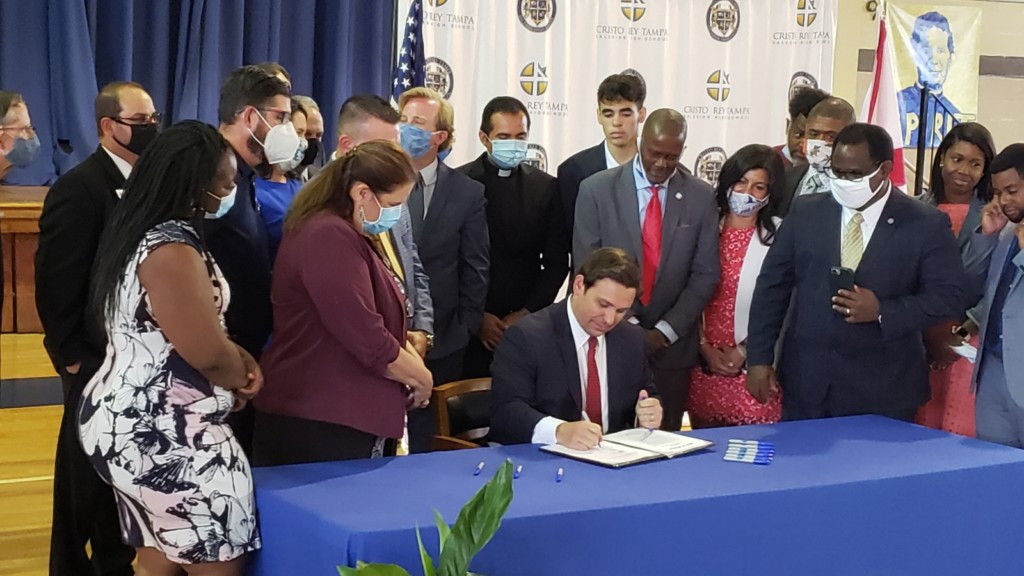
Florida Gov. Ron DeSantis today signed a bill that expands and aligns two K-12 scholarship programs that serve economically disadvantaged students.
The new legislation aligns the policies between the Family Empowerment Scholarship, adopted last year and serving 18,000 students, and the Florida Tax Credit Scholarship, created in 2001 and serving 108,000 students.
Minutes before singing the bill at Cristo Rey Salesian High School in Tampa, where nearly 90 percent of the school’s 175 students attend on a state scholarship, DeSantis told the students, educators and lawmakers who assembled to witness his signature that the Legislature worked hard this year to deliver on its educational promises to students and families.
“We had success in the first year with the Florida Empowerment Scholarship, but we had 15,000 to 20,000 on a wait list for the Florida Tax Credit Scholarship,” DeSantis said. “We wanted kids off the wait list to empower families, many of them working single mothers, so they could have meaningful choice.”
Cristo Rey president Scott Morreale praised DeSantis for his long-standing commitment to education choice in Florida.
“The governor understands that we are moving toward a new definition of public education,” Morreale said. “Thirty years ago in Florida, public education meant one thing: your zoned school district assignment was determined by your ZIP code.”
Chikara Parks of St. Petersburg, whose four children participate in the Florida Tax Credit Scholarship program, attended the bill-signing and thanked DeSantis for “making me and my family count.”
“Thank you for creating our new norm,” Parks said. “Thank you for believing.”
Besides alignment and expansion, the legislation increases the allowed enrollment growth in the Family Empowerment Scholarship program. Previously, the program could grow by up to 0.25 of total public school enrollment each year, or roughly 7,000 students. The program now can grow to 1 percent, or by roughly 28,000 students.
The new law gives clear priority to renewal students in both programs and provides for a gradual increase in household income eligibility over time. That provision allows the eligible income level in the Family Empowerment Scholarship, currently 300 percent of federal poverty, to increase by 25 percentage points in the next year if more than 5 percent of the available scholarships remain unawarded.
The income limit for the Tax Credit Scholarship, funded by corporations that receive tax credits in exchange for donations to the program and administered by Step Up For Students, which hosts this blog, is unchanged at 260 percent of poverty.
The law now allows students who receive scholarships in either program to remain on the scholarship until they graduate or turn 21.



My son (now 23 yrs) grad. HS in 2016. He is my nephew. His mom died at his age 3. I raised him and have full guardianship. He has the college pd. Until age 28. He did go to Valencia for a while. Due to having to work 2 jobs it was difficult for him. He wants to get his degree yet the school of choice and offers what he wants is private. Does this help him? If no then exactly how will his benefit him?
See above